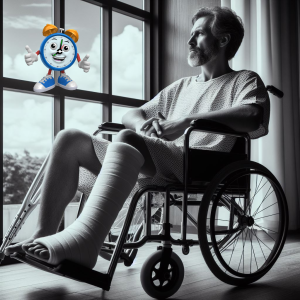Serious Injury: Rehabilitation: Why Early Access Matters in Personal Injury and Clinical Negligence Claims
Following a serious injury, the road to recovery can be long and arduous. Early access to rehabilitation is widely recognized as a critical factor in maximizing a patient’s chances of a full and successful recovery. However, significant disparities exist in how readily this vital support is available, particularly when the cause of the injury stems from a legal case. This article explores the importance of early rehabilitation in both personal injury and clinical negligence claims, highlighting the challenges faced and potential solutions for ensuring timely access to these essential services.
Personal Injury Claims: A Collaborative Approach
In the personal injury (PI) sector, the benefits of early intervention are well-understood. The sooner an injured person receives the necessary therapy and treatment, the greater the likelihood of a positive outcome. This translates to a faster return to daily activities, including work, hobbies, and a fulfilling family life. From the claimant’s perspective, early rehabilitation facilitates a quicker and more complete recovery. For “compensators,” insurers who manage claims, a claimant who is back on their feet and no longer requires extensive care translates to reduced overall claim costs.
However, the path to recovery isn’t always smooth. Sadly, for those who have sustained a life-altering injury, no amount of financial compensation can truly restore their previous life. The best course of action is to provide them with the resources necessary to maximize their recovery potential. This includes access to the tools, financial support, and treatment they deserve to lead a fulfilling life moving forward.
Early Intervention
The key lies in establishing early communication and intervention. Upon accepting a case, we prioritize contacting the compensator. A formal Letter of Claim outlines the details of the client’s injury claim and the severity of their injuries. This document invites the compensator to actively participate in both the claim process and the rehabilitation journey from the outset. This initial communication often includes a discussion with the client regarding their preferences for single versus joint case manager instruction. Once the client’s wishes are established, they are formally presented to the compensator.
The response from the personal injury sector is often positive. Insurers typically engage in the case manager selection process, facilitating an early “Immediate Needs Assessment” (INA) to determine the client’s specific requirements. Additionally, an initial interim payment is often requested to alleviate the significant financial strain that a serious injury inevitably brings.
Support for Serious Injury
This positive collaboration sets the stage for a productive and successful case. The claimant benefits from a supportive environment where their needs are prioritized. Imagine the mental and physical toll a life-altering injury can take, with daily routines now revolving around carers, therapists, and medications. The initial months following such an event are particularly challenging. When a claimant feels supported and their rehabilitation progresses smoothly, their mental outlook naturally improves, leading to a more successful overall outcome – a win-win situation for all parties involved.
Of course, there are roadblocks. The main factor impacting a compensator’s engagement in rehabilitation is the presence of unclear liability. In situations where liability is contested or requires further investigation before a determination can be made, the compensator may be hesitant to fully commit to rehabilitation resources. However, they are often more receptive to a jointly instructed case manager who can meet with the client and prepare an INA, even if initial rehabilitation services are limited pending a final liability decision.
Early Disclosure
Obtaining necessary liability documents early on is crucial in these scenarios. Unfortunately, it’s not uncommon to encounter delays due to a lack of cooperation from authorities like the police or the Health and Safety Executive who may be hesitant to release relevant documents or information. These delays can have a significant negative impact on the injured party’s recovery.
Challenges
It’s important to note that we are not alone in facing these challenges. Many compensators share similar frustrations in obtaining crucial documentation. The National Policing Guidance note offers a welcome step forward, providing clear guidelines on which documents each police force should provide and the timeframe for their release, even in cases with pending prosecutions. Referencing this document when requesting information from the attending police constabulary can be highly effective. Notably, the note emphasizes the importance of early information disclosure for civil litigation, acknowledging the positive impact on timely case assessment, court proceedings, and the securing of interim payments for claimants. This recognition of the benefits of early intervention across sectors is encouraging.
Liability Disputed
Even when liability is disputed and funding for rehabilitation remains unavailable, requesting an early interim payment is still strongly recommended. If this request is denied, pursuing legal action may be the most appropriate course of action. Often, initiating court proceedings can help expedite a resolution by forcing a clearer definition of the issues at hand, compared to a purely voluntary approach.
Clinical Negligence Claims: A Different Landscape
The challenges faced by clinical negligence claimants in accessing interim payments and early rehabilitation mirror those encountered in personal injury cases. Clinical negligence litigation is often fiercely defended, at least until both parties have had the opportunity to review all available medical records and obtain independent expert opinions. Even then, complex arguments
Conclusion: Prioritizing Your Recovery with Experienced Guidance
As we’ve seen, early intervention through rehabilitation is paramount for maximizing your chances of a full recovery after a serious injury. While challenges exist in both personal injury and clinical negligence cases, there are steps you can take to prioritize your well-being. We understand the complexities of the legal system and the emotional toll a serious injury can take.
Here’s what you can do:
- Seek legal advice as soon as possible. An experienced personal injury or clinical negligence lawyer can help you navigate the legal process, fight for fair compensation, and advocate for access to the rehabilitation services you deserve.
- Be proactive in communicating your needs. Clearly communicate your desired level of rehabilitation support to your legal team and any involved insurers or healthcare providers.
We Can Help
Our firm has a proven track record of success in securing early access to rehabilitation for our clients in both personal injury and clinical negligence cases. With over 25 years of experience, we understand the intricacies of these legal areas and are dedicated to helping you achieve the best possible outcome.
Contact us today for a free consultation. Let’s discuss your situation and explore your options for obtaining the rehabilitation support you need to move forward with your life.



